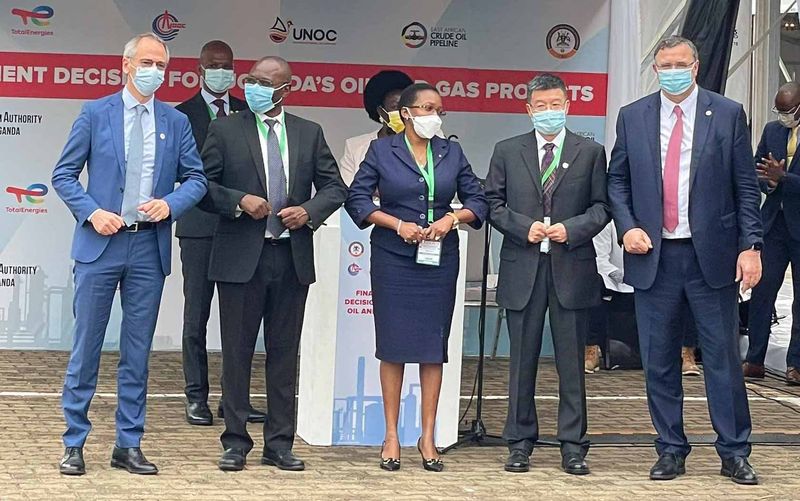

Total Energies CEO Patrick Pouyanné, right, shakes elbows with his CNOOC counterpart, and their Uganda National Oil Co. Boss Proscovia Nabbanja at the announcement of the FID
“In the name of the Joint Venture Partners and on behalf of TotalEnergies, I announce Final Investment Decision for the Lake Albert Development Project”, declared Patrick Pouyanné, the chairman and chief executive officer of TotalEnergies SE, in a ceremony held on Tuesday, February 1, at Kololo Independence Grounds in Kampala.
Described by many as “historic”, the announcement was met with great excitement and anticipation from government officials and a large section of Ugandans. It has literally given the country’s development journey a new lease of life.
Several oil and gas sector experts and analysts have predicted that this Final Investment Decision will massively boost the Ugandan economy, creating over 160,000 direct jobs and indirect jobs for Ugandans.
Relatedly, the Petroleum Authority of Uganda has ring-fenced some 25 fields, including hotel and catering, transport and logistics, security, civil works, human resource management, survey, and provision of labour, among others, for only Ugandans.
I hate to be the bearer of bad news but, I think, these magical expectations could be all for nothing. According to Wood Mackenzie, a respected Energy Research & Consultancy firm, global oil demand will fall by 70 per cent by 2050. The decline in oil output would lead to asset impairments and bankruptcy or restructuring for oil companies.
These fears have also been expressed by President Museveni who recently said that Ugandans should not be worried about the Okudiba (lack of market) of our crude oil, noting that there are multiple ways it can be deployed for the benefit of the economy.
Of course, the bleak future of the global oil and gas sector is being driven by climate change. Research indicates that the burning of fossil fuels – including oil, coal and gas – has been responsible for 86 per cent of carbon dioxide emissions in the past 10 years.
Mr. Pouyanné said that TotalEnergies was “fully aware of the important social and environmental challenges [the project] represents” and aimed “to make it an exemplary project in terms of shared prosperity and sustainable development”.
However, in his response, Thom Allen, an oil analyst, noted that a typical barrel of light crude oil might produce around 390kgs of carbon dioxide when burnt and that “calling an oil project ‘low-emissions’ is a misnomer”. He also refuted TotalEnergies’ claims of low production costs, saying that the claims were misplaced.
The International Energy Agency (IEA), in its special report issued in May 2021, describes a roadmap through which the world could bring global energy-related carbon dioxide emissions to ‘Net Zero’ by 2050. But to attain this goal, the global oil demand alone would need to collapse by 75 per cent over the next three decades.
Further, the IEA Roadmap sets out more than 400 milestones to guide this global journey. In part, these milestones include, from today, no investment in new fossil fuel supply projects and by 2035, there are no sales of new internal combustion engine passenger cars.
The plans also include ensuring that by 2050, almost 90 per cent of electricity generation comes from renewable sources, mainly wind and solar PV. Solar energy is expected to be the world’s single largest source of total energy supply.
These efforts were also echoed during the COP26 Summit held in the United Kingdom (UK) last year. For instance, 34 governments and five development banks agreed to end financial support for fossil fuel projects, including oil and gas, by the end of 2022, shifting billions of dollars away from fossil fuels.
The Summit saw the official launch of the ‘Beyond Oil and Gas Alliance’, an initiative by Denmark and Costa Rica, to spur a global phasing out of oil and gas in line with IEA’s aspirations.
Furthermore, the Summit saw a declaration on zero-emissions cars and vans, committing signatories to work towards 100 per cent zero-emissions vehicle sales by 2035 at the latest in leading markets, and by 2040 globally. On its part, the UK confirmed plans to end the sale of all new diesel trucks between 2035 and 2040.
Well, I should also mention that, as it is today, oil remains the dominant source of energy in lots of countries and still enjoys significant government support. But in light of the above resolutions, a major worldwide push to demonstrate and deploy clean energy technologies is on the horizon.
Many governments, especially in the developed world, are increasingly reprioritising their spending on research and development – putting them at the core of energy and climate policy.
Today, cars and trucks are going ‘green’ at a rapid rate in some countries. For example, in Norway, over 50 per cent of new car sales are electric vehicles. And in the United States, it is estimated that a third of all vehicles on the road will be electric by 2040.
In the end, what remains abundantly clear is that by 2050, the energy world will look completely different from today and countries such as Uganda may find themselves stranded with huge chunks of worthless oil.
But the only glimmer of hope could come from adaptation and proactiveness: Uganda’s oil business model should be restructured to adapt and prioritise management of carbon emissions across the value chain.
And on a brighter side, transitioning to a ‘Net Zero’ energy system will also offer countless opportunities for our economy. The jump in private and government spending may create millions of jobs in clean energy, including energy efficiency, as well as in the engineering, manufacturing and construction industries.
So, let’s cut the celebrations and get back to work once more!
Mr. Mukalazi is the Country Director of
Every Child Ministries Uganda.
bmukalazi@ecmafrica.org














Brian Mukalazi
Leave a Comment
Your email address will not be published.